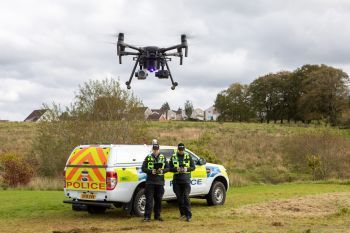
Technology used by Police Scotland to find missing people
- Featured on BBC Scotland, 4 November 2019
- Times Higher Education award winner 2020 (Knowledge Exchange/Transfer Initiative of the Year)
- Ceed Scotland awards winner 2020 (Innovation category)
- Scottish Knowledge Exchange Awards Highly Commended (Multiparty Collaboration category) 2018
Ground-breaking AI technology being developed in Scotland will soon enhance Police Scotland’s use of remotely piloted aircraft systems (RPAS) to find missing and vulnerable people.
The technology, believed to be the first of its kind used by police forces in the UK, is a form of machine learning that provides real-time image analysis for identifying humans in rural areas. It has been developed by a consortium of partners – CENSIS, Thales UK, University of the West of Scotland and Police Scotland.
With core AI development work complete and trials of the new system already underway, the project team expects the technology to be deployed in searches for missing and vulnerable people in Scotland in the near future.
- The technology identifies where a human being is located, rather than an individual. No facial recognition is involved.
Computers with very large amounts of data processing power were previously required to run similar technology, rendering it immobile. However, the specifically designed algorithms developed in this project can be used on a smartphone or tablet connected to an RPAS.
Trained with hundreds of hours of footage of police officers in different clothing, positions, and situations – and with all footage taken on police premises – the AI scours an image and can locate a person within seconds at a distance of up to 150 metres.
- The system is twice as fast as other state-of-the-art algorithms and its ability to recognise a human is enhanced the more it is used.
The RPAS is operated by a specially trained officer on the ground, while another officer receives a real-time video feed from the RPAS cameras on a smartphone. The incorporation of the AI technology will help Police Scotland cover large areas of ground in the search for a missing person, reducing the need for lengthy and meticulous checks from teams of officers on the ground.
Initially being employed in the search for missing and vulnerable people, the technology could potentially be used in a variety of other applications, including monitoring wildlife on land and at sea.
The technology will be showcased for the first time at the CENSIS 6th Technology Summit, 7 November, Glasgow Royal Concert Hall.